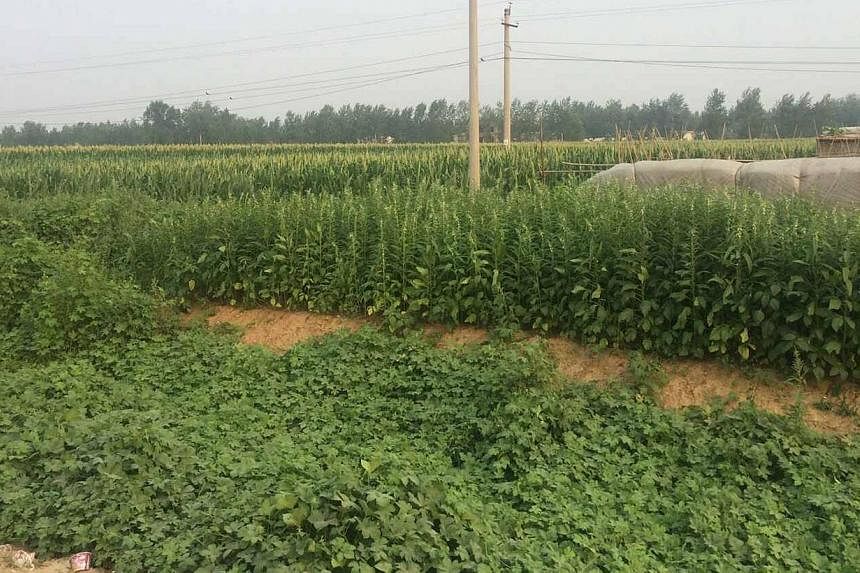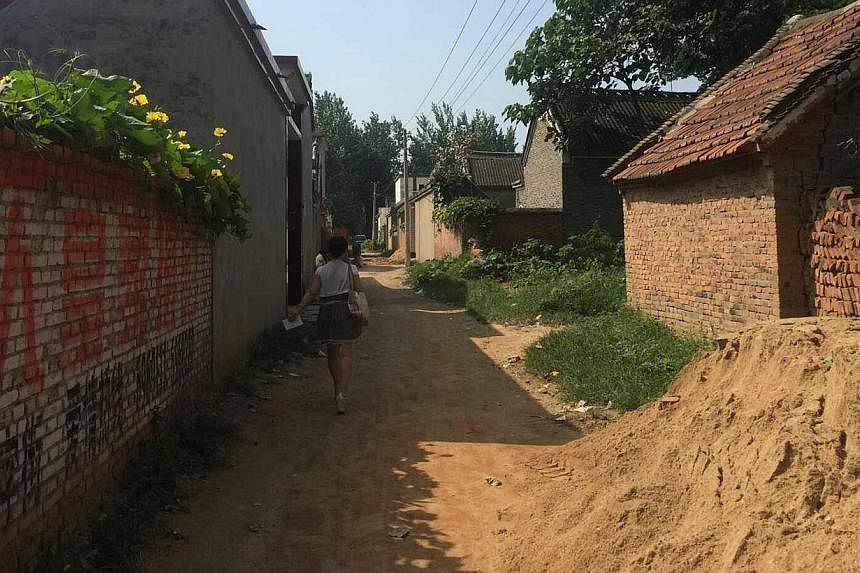The village where Kang lives is as far removed as one could possibly get from New York, where I now live. It is located outside of Shangcai, a small town of smelly hotels and dirty restaurants, which is itself an hour-long bus ride away from Zhumadian, a fourth-tier city in Henan province.
The birthplace of Chinese civilisation and home of the renowned Shaolin Temple, Henan is now one of China's poorest provinces. In the past two decades, its main claim to fame has been the high concentration of so-called "Aids villages" near Shangcai.
Kang operated extractors on construction sites for a living, so he was tanned like tar. His dark pants, rolled above his skinny ankles, were splattered with mud stains. I met him, his wife, and another young man for the first time over dinner as I was travelling in China during summer, researching my next documentary film.
When I met my friend Chung To in Beijing at the beginning of the summer, he encouraged me to visit Shangcai. Chung To heads the Chi-Heng Foundation, a non-profit group assisting children impacted by Aids. Initially, I was reluctant to go. I told him I wasn't looking for sad, teary stories - those have been done. I wanted to continue my exploration of China's growing aspirations, as in The Road To Fame, my latest film about students at an elite acting school in Beijing.
Then you definitely need to go to Shangcai, Chung To insisted.
But Shangcai, geographically in the centre of the Middle Kingdom, didn't seem at all representative of the new, prosperous and ambitious China. At first glance, Kang and his wife Fei couldn't be more different from the urban youth I had come to know. In big cities, youth don hipster fashion from Japan and South Korea, watch American TV shows online, and chatter as loud and fast as their American peers. In Shangcai, the young people appeared tentative and ill at ease, like underdeveloped children still in high school, or even middle school.
Aids villages
WHAT sets Shangcai youth apart is that they grew up not only in poverty, but also in the shadow of Aids. In the 1990s, villagers around Shangcai sold blood to commercial - and mostly illegal - blood collection agencies to make ends meet. Needles and tubing were reused and, once the desirable plasma was removed, red blood cells were pooled and reinfused into the donors, to prevent anaemia. Thousands were infected with HIV. Newly infected mothers passed the virus to their babies through childbirth and breastfeeding, and children and adults contracted HIV after receiving contaminated transfusions in hospitals. In 2000, the HIV infection rate in Wenlou village outside Shangcai was as high as 65 per cent. People started dying, the healthy shunned the sick, and the government clamped down on any reporting of the dire situation around the area.
Kang was diagnosed with Aids in 1999 when he was only five years old, having contracted the virus from his mother. His mother sold blood to help pay fines imposed by the village family planning agency. Despite the communist government's longstanding one-child policy, his father had insisted on having a son, even though he already had four girls.
Three years after Kang's diagnosis, his mother died and Kang grew up going in and out of hospitals. Both of his wife's parents had been similarly infected from selling blood. The other young man at our table, who fixed computers for a living, had contracted the virus through a plasma transfusion in his early teens.
I felt awkward prodding them for their sad stories, so I tried some small talk, but that soon fizzled. It's impossible even for an optimist to find hope when none apparently exists. Things in Shangcai have improved some.
Forgotten stories
THE government eventually acknowledged the Aids epidemic in Henan, allowed reporters to investigate and instituted free prevention and treatment programmes. Commercial blood selling disappeared. Despite early corruption in the distribution of free drugs, the treatment programmes seem to have brought the disease under control. HIV patients now receive government subsidies and, warily, local governments have allowed groups like Chi-Heng to help children infected with HIV or orphaned by Aids to go to school. But many have died, and survivors have been scarred. Nowadays, few reporters visit Shangcai and, contrary to Chung To's promises, everyone seemed eager to leave these sad, teary stories behind.
The next day, I woke up late and went to Kang's home in the village with Liu Li, a staff member from the foundation conducting routine visits to families afflicted by Aids. I thought of backing out but it was a pre-arranged trip.
It was a clear and muggy July morning. Dirt roads cut through the village, their surface chopped into deep ridges by past rainfalls. The cicadas chirped merrily and, surprisingly, most of the houses looked well-kept and clean. As soon as we arrived, Kang's father and stepmother, who had lost her former husband to Aids and was herself HIV-positive, served us tea and cleaved open a watermelon. It was grown on their own land. "All organic,"?they emphasised.
Chewing on watermelon, Liu asked about the patients' drug regimen. Kang muttered something about the drugs' side effects. Here in Henan, the free drugs do not include the newest, more expensive kind. So whenever the medication made him sick, Kang stopped taking it, affecting his white cell count and making him a frequent visitor to the hospital.
Liu gently reprimanded them and then asked about Fei. "Oh yes, of course she's taking her drugs religiously." Everyone chimed in eagerly, the loudest being Kang's father. He pointed at Fei's tummy - "that's all we worry about now".
Kang and Fei had been married for only six months and Fei got pregnant by accident two months ago. At dinner the night before, he'd mentioned not having wanted a baby so soon. His wife had wanted to travel and see the world a little first. But in the village, 20 was considered the right age to procreate and no one was sure how long Kang's condition would remain stable.
A better life
LIU reiterated that with the cocktail regimen, it was very likely the baby would be HIV-free and live a long and healthy life. A big grin appeared on Kang's father's face. I want at least three grandkids, he said. Kang frowned again and mumbled: "One would be enough, 'cause it's expensive now to raise a kid properly, if one wants to raise a kid like the city folks."?
The old man ignored him. He said that during the years when Kang was very sick, in and out of intensive care, he sold everything to pay for his treatment. He stopped working and started drinking. He said he had given up all hope on living. Now - he pointed at Kang excitedly - his son was healthy again and a grandchild was on the way. The bloodline was being continued, which gave him hope to enjoy work again, to enjoy life again. His family owned about 0.4ha of land and he rented another 0.8ha from neighbours, which he farmed all by himself.
There were some in the village who milked the government's Aids care programmes so they didn't have to work. Dishonourable, he said. In this family - he waved his hand for emphasis, a big slice of watermelon held firm between his fingers - we have to rely on our own hands and do honest work.
I surveyed their animated faces and their bare-bone living room, and marvelled at the new table and chairs built of sturdy wood.
Here, in an average village house, a poor Chinese family has struggled with HIV for 15 years. Their hearts have been broken and their families have died. Outside of the village, they are still being discriminated against, forced to obfuscate their origins. Yet, tenaciously, they hold on to the hope of a better life, like other Chinese who had to wipe away the scars of the Cultural Revolution, or the older generations who migrated to America for the promise of the Gold Mountain.
Before I left, Kang and Fei showed off their wedding photos. Like all marrying couples in China, they had hired a professional cameraman to take glamour shots. With the help of Photoshop, Kang's face, tarred by the sun and scarred by lesions of Kaposi's sarcoma, appeared clean. In their brightly coloured costumes, he and his wife looked just like any other young Chinese couple, hopeful, unhindered by past tragedies.
I remembered what Chung To had told me at the end of our coffee: People like them are the foundation of a nation's dreams.
Hao Wu is an independent film-maker and a fellow at New America Foundation. He wrote this for Zocalo Public Square, a project of the Centre for Social Cohesion at Arizona State University and a not-for-profit "ideas exchange" that blends live events and humanities journalism.


